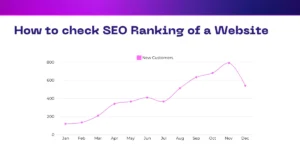What Is SEO Ranking?
SEO (Search Engine Optimization) ranking refers to the position that a website holds on a search engine results page (SERP) for specific keywords. It plays a crucial role in determining how much organic traffic your site will receive from search engines like Google. The higher your ranking, the more likely users will click on your website.
Importance of Checking Your Website’s SEO Ranking
Why should you care about checking your SEO ranking? Well, it helps you measure the success of your SEO efforts. If you’re investing time and resources into improving your website’s visibility, you want to know where you stand. Regular checks can help identify strengths, weaknesses, and opportunities for improvement in your SEO strategy.
How SEO Ranking Works
Factors That Affect SEO Rankings
Several factors influence your website’s SEO ranking, including:
- Content quality: Search engines prioritize relevant, high-quality content.
- Keywords: Targeting the right keywords for your niche.
- Backlinks: Websites with more authoritative backlinks rank higher.
- Mobile-friendliness: Your website should be responsive on mobile devices.
- Page speed: Slow websites often rank lower due to poor user experience.
How Search Engines Rank Websites
Search engines, particularly Google, use complex algorithms to determine where a website ranks. These algorithms assess factors such as keyword relevance, on-page optimization, and user engagement. The goal is to provide users with the most relevant results for their search query.
Tools to Check SEO Ranking
Free SEO Tools
You don’t have to break the bank to check your SEO ranking. Some effective free tools include:
- Google Search Console: Tracks your site’s performance and keywords.
- Ubersuggest: Offers keyword ranking insights and competitor analysis.
- Moz’s Free SEO Tools: Includes rank tracking and link analysis features.
Paid SEO Tools
If you’re ready to invest in premium SEO tracking, here are some top paid tools:
- SEMrush: One of the most popular tools for tracking rankings, keywords, and competitors.
- Ahrefs: Excellent for backlink analysis and keyword tracking.
- Serpstat: Offers a comprehensive SEO toolkit, from rank tracking to competitor analysis.
Manual Methods to Check SEO Ranking
Using Google Search
If you want a quick and simple method to check your SEO ranking, just Google your target keywords. Type your keyword into the search bar and see where your site appears on the SERP.
Analyzing Search Engine Results Pages (SERPs)
Another manual method is to analyze the SERP directly. Keep an eye on where your site appears for various queries and whether featured snippets or ads are pushing your ranking down.
Using Google Search Console for SEO Ranking
Setting Up Google Search Console
Google Search Console is a free tool that gives you insight into your website’s SEO performance. To start using it, create an account and verify your site ownership by following Google’s steps.
Checking SEO Performance in GSC
Once your site is verified, head to the “Performance” section. You’ll see a breakdown of keywords, impressions, clicks, and your average position in the search results for each query.
Using SEMrush for SEO Ranking
Features of SEMrush
SEMrush is a paid tool that offers in-depth SEO insights. It provides keyword rank tracking, backlink analysis, and competitor insights.
How to Track SEO Rankings with SEMrush
To track your ranking, create a project and input the URL of your website. Then, add the target keywords you want to monitor, and SEMrush will display your rankings in real-time, alongside historical data for comparison.
Using Ahrefs for SEO Ranking
Features of Ahrefs
Ahrefs is another robust SEO tool, known for its comprehensive backlink analysis and keyword rank tracking capabilities.
SEO Ranking Insights via Ahrefs
With Ahrefs, you can track keyword rankings over time, compare your SEO performance with competitors, and receive insights on potential keyword opportunities.
Keyword Tracking for SEO Ranking
Importance of Keywords in SEO
Keywords are the foundation of SEO. They help search engines understand the relevance of your content to user queries. Monitoring your keyword rankings is critical to assess your website’s SEO health.
Best Practices for Keyword Tracking
- Focus on a mix of short-tail and long-tail keywords.
- Monitor keyword performance regularly using tools like SEMrush or Ahrefs.
- Optimize content based on trending keywords in your industry.
Competitor Analysis for SEO Ranking
How to Check Your Competitors’ SEO Rankings
You can use tools like Ahrefs, SEMrush, or Moz to monitor your competitors’ keyword rankings. Simply input their website’s URL to see which keywords they rank for.
Tools for Competitor Analysis
- SpyFu: Ideal for understanding the SEO strategies of your competitors.
- SERPWatcher: Tracks competitor rankings and offers insights into their SEO performance.
Mobile SEO Ranking Check
Importance of Mobile SEO
With mobile search growing rapidly, it’s crucial that your website performs well on mobile devices. Google now uses mobile-first indexing, which means it primarily evaluates the mobile version of your website.
Tools to Check Mobile SEO Rankings
Tools like Google’s Mobile-Friendly Test and SEMrush offer mobile SEO performance reports, helping you understand how your site ranks for mobile queries.
Local SEO Ranking
What Is Local SEO?
Local SEO focuses on optimizing your website to rank higher in location-based searches. It’s especially important for businesses with physical locations, like stores and restaurants.
Tools to Measure Local SEO Performance
You can use tools like Moz Local or BrightLocal to track your local SEO rankings, including how you perform in Google Maps and for local keywords.
SEO Reporting and Insights
Understanding SEO Reports
An SEO report provides a snapshot of how well your website is performing. It includes data on traffic, rankings, and keyword performance.
How to Generate Actionable SEO Insights
To generate useful insights from your SEO report:
- Look for patterns in keyword performance.
- Identify opportunities for content optimization.
- Track your backlink profile to ensure it’s growing.
Improving SEO Ranking
Quick SEO Fixes
- Optimize your meta descriptions and title tags.
- Compress images to improve site speed.
- Ensure your website is mobile-friendly.
Long-Term SEO Strategies
- Develop a content strategy around your target keywords.
- Build high-quality backlinks from reputable sites.
- Engage in regular competitor analysis and keyword research.
How Often Should You Check Your SEO Ranking?
SEO Ranking Frequency
You should aim to check your SEO rankings at least once a month to stay updated on performance. However, if you’re actively making changes, check weekly to monitor improvements.
Best Times to Re-Evaluate Rankings
It’s best to evaluate your rankings after any significant site updates or SEO campaigns to assess their impact.
Conclusion:
Monitoring your website’s SEO ranking is essential for ensuring you’re moving in the right direction with your SEO efforts. By using a mix of manual methods and specialized tools, you can keep track of your rankings, optimize where necessary, and ultimately, improve your visibility on search engines.
Frequently Asked Questions
Ans. Google Search Console is widely regarded as the best free tool for checking SEO rankings.
Ans. You can use tools like Google’s Mobile-Friendly Test or SEMrush to check mobile-specific SEO rankings.
Ans. Yes, with tools like Ahrefs or SEMrush, you can easily check your competitors’ SEO rankings.
Ans. It’s recommended to check your SEO ranking at least monthly or more frequently if you’re making significant changes to your website.
Ans. No, keyword ranking is just one piece of the puzzle. You also need to focus on other factors like content quality, backlinks, and user experience for comprehensive SEO success.


